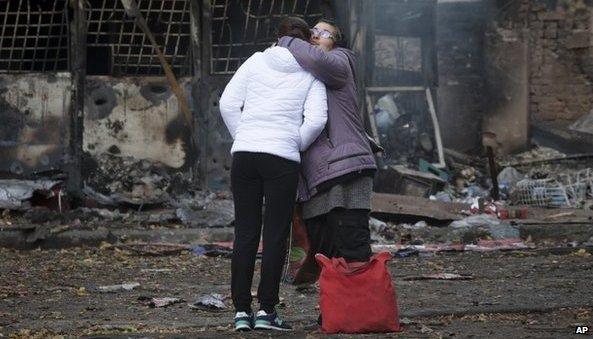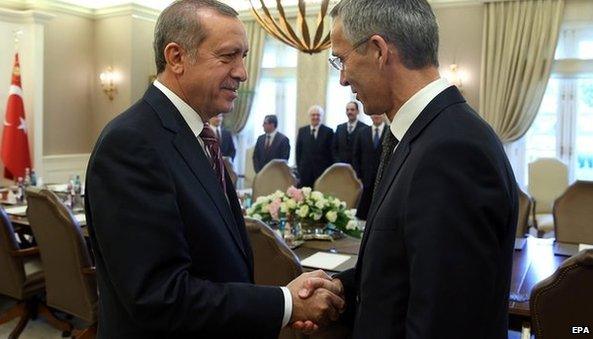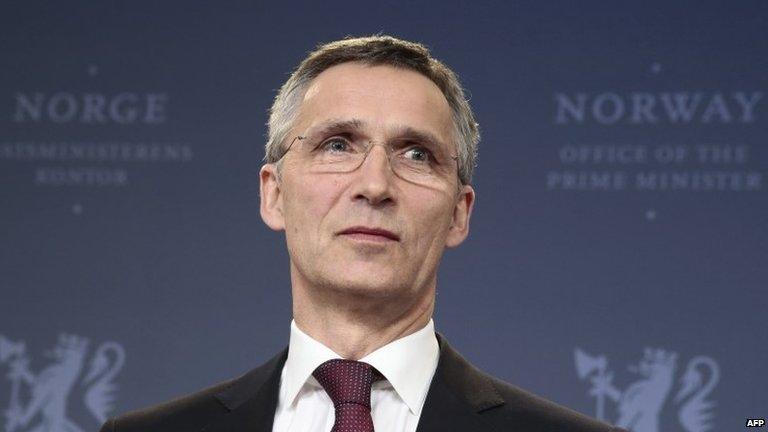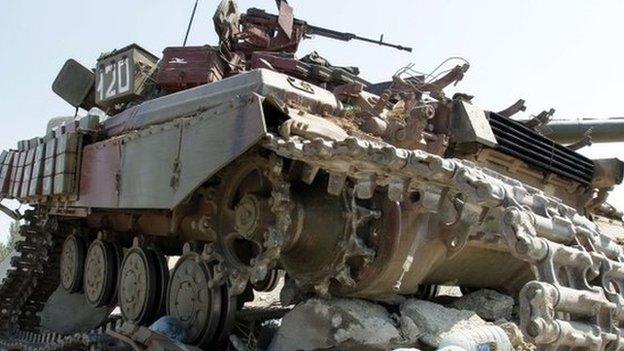New Nato boss Jens Stoltenberg on alliance's challenges
- Published
Jens Stoltenberg has taken over Europe's top defence job at a crucial time
How do you keep Western countries focused on their security and the need to spend more on it at a time of austerity?
That is Jens Stoltenberg's "main responsibility", he says, having taken over as the secretary general of Nato at the start of October.
In his first BBC interview, the former Norwegian prime minister argues that military preparations will get boosted because "this is not me imposing a decision on the allies, but it's the allied countries that have made the decisions".
Part of keeping the alliance focused on what lies ahead involves reminding people of Russia's recent behaviour in Ukraine and the need to show a credible response.
The secretary general told us that he believed Russian special forces were still in eastern Ukraine, despite the "substantial decrease" in their regular troops there, and he called upon Russia "to withdraw all troops from Ukraine and to stop destabilising Ukraine".
'No Cold War'
But Mr Stoltenberg is also someone known, while leader of Norway, to have enjoyed good relations with Vladimir Putin and to be leading an alliance that now contains many members who are lukewarm about perpetuating sanctions on Russia.

Despite the ceasefire agreed on 5 September, Donetsk has continued to come under shell attack
Asked whether this is a new Cold War, he delivers a flat "no", even when I put it to him that senior Russian officials now talk in terms of sustained bad relations or of the USA being Russia's "eternal enemy".
In a speech this week to the German Marshall Fund of the United States (GMF) Mr Stoltenberg, external insisted: "There is no contradiction between being pro-collective defence and a strong Nato and pro-engagement with Russia."
The pitch from the secretary general is more dovish than those of his Danish predecessor Anders Fogh Rasmussen.
Spending cuts
It's true that Cold War stalwarts like Ronald Reagan or Margaret Thatcher would have had the same message as the new Nato chief, of maintaining a strong defence while engaging constructively with the Kremlin, but times have changed and these days a twin-track policy is harder to sell.
For one thing, Nato's members are mostly intent on cutting their defence spending.
Having committed at Nato's Wales summit in September to halt such reductions and work back towards higher figures, just weeks later all of the eurozone economies have filed spending plans with the European Commission that involve further defence cuts.
Mr Stoltenberg is left pointing to Poland and Romania, both of which feel directly threatened by Russia, as examples of nations actually doing the "right" thing - spending more.
With a peace agreement holding out, albeit shakily, between Ukraine and Russia, there are, FT columnist Gideon Rachman wrote on Tuesday, external, "influential voices within the EU urging the Ukrainians to 'accept reality'".
Move on, some countries, are saying. There is business to be done with Mr Putin.
Key priorities
Another difference between now and the Cold War is that the link between the US and Europe is weaker.

Jens Stoltenberg met the Turkish President earlier this month to discuss the IS threat in Syria and Iraq
Recent statements by Russian leaders have quite deliberately differentiated the more understanding Europeans from the US, which, according to a recently rewritten national security doctrine, is Russia's "main enemy".
There is one other thing that could make it harder for Mr Stoltenberg to lead a renaissance of the Western alliance, and that is the discord within a 28-member organisation about what its key priorities should be.
The campaign against the self-proclaimed Islamic State (IS) has opened fresh fissures.
Some Nato nations, like the UK, France, Denmark, Belgium and the Netherlands, have joined the US in airstrikes against the militants.
IS challenge
However, all of them have limited their action to Iraq, where the legal position is clearer than in neighbouring Syria, and many other Nato members wouldn't dream of joining in.
Turkey's position has become particularly problematic.
Its government could, if it chose - and its parliament has approved - allow the coalition partners to attack from Turkish bases, making the air campaign more effective and far easier logistically.
But it chooses not to, facing accusations that it is soft on Islamic State militants and more interested in toppling the regime of Syrian President Bashar al-Assad.
Mr Stoltenberg insists that the situation on Nato's southern flank can be deployed as a further reason to act on the Wales summit decisions, not just to boost spending but also to field a Rapid Reaction Force that could go to the help of a threatened member.
This new concept is just as valid for the south as for the east, he says.
The risk, though, is that the threat of Islamic militancy helps to defocus the alliance further, adding still more tasks to its "to do" list, reducing consensus about where the greatest danger lies and the costs involved in addressing it.
- Published1 October 2014

- Published6 September 2014
